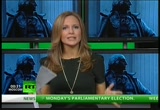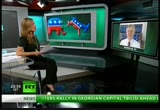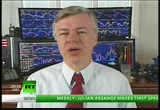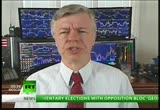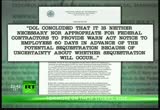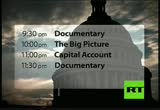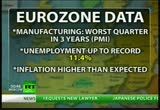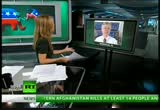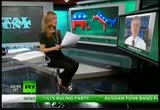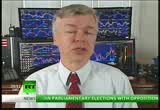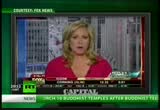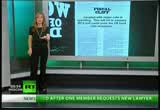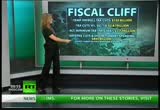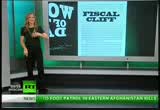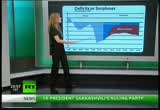tv [untitled] October 1, 2012 4:30pm-5:00pm EDT
4:30 pm
good afternoon and welcome to capital account i'm more in lister here in washington d.c. these are your headlines for monday october first two thousand and twelve the u.s. presidential candidates may be gearing up to face off in their first debate this week but aren't they both already losers in the deficit debate can any amount of rhetoric fill the gaps in their deficit plans and where is the country headed without sound now slowing down money we'll hear from blogger author and radio host karl denninger of the market taker on that and while the budget plans of presidential candidates may not add up we already know the lack of government planning has the u.s.
4:31 pm
poised for this. fiscal cliff looming the fiscal cliff it's looming scorched earth partisan politics could push america over of this cliff. but daunting name and the right this what exactly does this entailed one break down the potential damage and word of the day and give you a glaring example of the wasteful costs of political uncertainty all ready documented plus we have a potpourri of manufacturing data out some points to opposite directions for the u.s. and of who learn who of it points to negative. outcomes in europe now our guest will help us make sense of these ingredients and tell us why he thinks the u.s. recession is already baked into the cake let's get to today's capital account.
4:32 pm
so income obama and. under mitt romney are getting ready to face off in their first debate wednesday in the race for an old president thanks to weigh in bonsai for this clever depiction of who he is dead dead brother versus mitt the twit as they wrestle to convince the public of who to vote for both may be wrestling with how best to avoid letting people know they don't have a sound plan for cutting federal deficits at least not according to analysts who say the math doesn't add up but here is how the one of the paul ryan recently dealt with this issue but i have to look at what you just haven't given me the money that we don't need to it would take too long to go through all of this. but he
4:33 pm
goes on to say and i paraphrase he swears it all works out just just trust him don't worry there's details now one tax you also are likely to hear about in this week's debate is the g.d.p. tax though our guest says it's going on now and it's going to continue so joining me to discuss it is karl denninger radio host for the market ticker and author of that blog and he's also the author of the book leverage how cheap money will destroy the world karl denninger thanks so much for being back on the show. that you will and for having me all right so let's not delve into what could or could not happen one day when these candidates face off in a political debate let's talk about how they're dealing with the deficit debate because many analysts say that the math of these two guys doesn't add up when it comes to their plans in terms of addressing a sixteen trillion dollar debt that is mounting every day with the government borrowing thirty two cents of every dollar so as you see it either of these guys have a plan and where do they each fall short. absolutely not barack obama has no plan
4:34 pm
at all he has told us nothing about what he actually intends to do it put together the deficit commission it sailed there was then supposed to be a sequester and now use going to have told people oh by the way even though you're supposed to warn people that they could be laid off they're not supposed to do that because we don't want to scare people before the election. and so that's you know it's on the democrat side on the republican side we have ryan who was on the t.v. shows this weekend who refused to answer the question about exactly what he was going to do take care of it he said it was too complicated well that sounds kind of like good nancy pelosi says you got to pass this bill before you can read what was inside it and we got the chance to read it we found out we really didn't like what was in there yet so i don't see any solutions coming from either one of these guys but the fact is and there's a basic reason behind this and that is that at present the federal government is spending about ten percent of our annual production our gross domestic product in
4:35 pm
deficit spending and if they stop that then they're forced to recognize that we've been in an economic depression for the last four years and hoops here it is any at the same time this is in fact a back door tax on the american people and that's what i want to get into because i don't think that anybody will hear these candidates on stage on wednesday favorite they're facing a g.d.p. tax and they've been facing a g.d.p. tax that's something though that you and i were talking about before the show so what is what you are calling a tax on g.d.p. . well it's rather simple really if you have ten thousand units of production in an economy in ten thousand units of creditor currency and the government comes along and says ok we're going to deficit spend so we're going to put another thousand units into there then the value of all of the units of credit in currency that currently exists go down by that amount so this is exactly identical from a functional standpoint as if the i.r.s. man showed up on down your door. and so give me ten percent of everything you have
4:36 pm
. unfortunately that would be very unpopular if you were to turn around and tell the american public oh guess what your taxes are not going up ten percent of what you currently pay they're going up by ten percent of your income and the tax on everything that you produce as a company is going up by ten percent of your production and yet that is essentially what's been going on now for the last four years and so when we look at why we haven't seen job growth and economic recovery the answer is right there we keep getting the all of these politicians and all of these wonderful talking points about the cut in the payroll tax and the bush tax rates and the fact of the matter is is that real in real terms taxes on the american people have risen precipitously and where are you getting that ten percent number thing that everyone claire. well the federal government is running about one point well over the last four years one point two to one point six trillion dollars in deficit say in the economy is a fifteen trillion dollar economy so one point six trillion dollars is about ten
4:37 pm
percent of that ok and so now you're saying that a deficit spending is essentially a tax who does this tax fall most most heavily on in the population even if those evenly on everybody and everyone and that's the problem with that there is no progress it would be to it it is a flat tax for all intents and purposes on every dollar of production because each dollar of credit currency is devalued and so you need more of them and yet your salary and your you know your other income typically doesn't go up so there is some ability to evade this of course the stock market is going up dramatically in the last four years but for the ordinary person who's out there trying to earn a wage it's an entirely different situation because their salary isn't going up at all and yet the cost of things like gasoline and heating oil is going to dramatically i mean so we have much talk right now about various taxes we have both
4:38 pm
candidates talking about their tax policies we have the fiscal cliff with the possible expiration of bush tax cuts and a payroll tax cut where do you factor in the g.d.p. tax in terms of significance looking at the scope of tax cuts or increases that everybody is talking about. if you look at the payroll tax cut the payroll tax cut was a two percent cut in the rate for the employer. and so what you saw was about a two percent increase in supposedly competitiveness this is a ten percent move the wrong direction and so from a standpoint of where we were prior to the recession with the bush tax cuts in place this is about four five times the size but going the wrong way so it is totally cancel these tax cuts that we have seen if you look at it in terms of the bush tax cuts then it's a little bit different because the bush tax cuts for some people took the marginal
4:39 pm
tax rates down fairly substantially but this distaff a spending if you remember lauren was going on to some degree during bush's presidency as well so that hidden tax was there during that time it just wasn't anywhere near as large and then how did this unravel because i imagine this can't go on like this forever. no it can't and the problem that you have with this sort of be a attempt to hide things is that the longer you do this the greater that get is that accumulates within the federal government that it requires service and of course the federal reserve right now is essentially buying up all of that ben bernanke you today cleaned that old this is a temporary thing we'll you know so is your lawyer if you will eventually die it is this defect disk or just this debt after you die it just doesn't matter very much now does it so i look at this from the standpoint of how long does this go on before the lower and middle or trials of the economy that is everybody median income and below gets squeezed to the point that they just simply can't survive
4:40 pm
anymore and that's the kind of thing that has happened over in europe where you've seen do you people rioting in the streets one of the primary drivers of people that get angry enough to riot is having an empty belly yeah that's for sure and you're saying that this tax when i was they fall more on on the working poor and the people who don't have money because it's like of consumption taxes ten percent across the board and so i will have to say how that does play out we know that a record number of people are on food stamps and can't afford to live now and one other issue that is looming is the fiscal cliff and we've heard plenty of fairmont bring a ballot add in what will happen if the u.s. go is often better just that it's a doomsday scenario if that's the case but this happens in january i want to know to what extent you think it is affecting the economy now or if this is all going to be felt in the future if the u.s. goes off the fiscal cliff or are partially goes off. this is tremendously impactful
4:41 pm
on your column each day and so are the deficit's because is able to actually employ or or actual employer you have a real serious problem you're trying to figure out. what your cost of operation is going to be in the future that's a big deal you have to factor all of those things into your competition in the whether or not to hire people what you believe final demand will be for your product or service and therefore what you should be prepared to produce it takes time to bring capacity online it takes time to train people in productive you know into productive work this is not something that happens overnight so you if you have a high degree of uncertainty as to what is going to be life you're naturally going to try to hold off as long as you can on any kind of expenditure that you would otherwise be i think it's a good point and one point you touched on earlier that now i want to get a little further into you found a way to quantify one example of how this political uncertainty is a cost right now and you found this great letter that's from the white house and
4:42 pm
it's about contractors government contractors and evidently there is some kind of a law that if you have more than one hundred employees you have to tell your employees if mass layoffs are coming off a big plant going to close sixty days in advance however the sequester ration and the uncertainty surrounding kind of throws a wrench in that and so here i want to bring up this letter and i've selected some quotes that we can pull out of it so the department of labor concluded that it is neither necessary nor appropriate for federal contractors to provide more enact notice and that the regulation i'm talking about are law to employees sixty days in advance of the potential sequester ation because of uncertainty about whether seacrest ration will occur so that is the guidance that they are giving to contractors and then they find that then then they have to do a lot for this that if the sequester ration does go through and if these contractors have followed guidance that any resulting employee compensation costs for the war an act liability is determined by a court as well as attorneys fees and other litigation costs. would qualify as
4:43 pm
allowable costs and be covered by the contracting agency so to me this just exit exemplifies for me the waste that is incurred when government doesn't work but i want to know we have a minute what does this signify to you. signifies to me that the government is telling people to break the law and that's been the problem since we got into this economic mess back in two thousand is that at the end of the day the government chose a road and chose certain people that are its favored few go ahead and break the law now how do you compete with somebody who is able to break the law yeah it's not very fair it's an example of crony capitalism and also creates the uncertainty that we're talking about and i want to talk more about that but we do have to go to a quick break for a minute carl we'll have more with karl denninger though in just a moment and also still ahead you have heard of warnings about the fiscal cliff we were just talking about it but when exactly is that stake what we're going down for you one word of the day but first your closing market numbers.
4:44 pm
4:45 pm
4:46 pm
a look at as the slew of bad data that came out today for europe all recap for you manufacturing thought the worst quarter in three years this is according to p.m.i. data france particularly was lousy unemployment went up to a record eleven point four percent inflation also came in higher than it's expected now combine that with some u.s. manufacturing data that we got out today and we had recently to that point kind of a different direction so i want to bring our guest in to add this all up and tell us what he comes up with so karl denninger let's just get back to this let's start with the the u.s. man you're manufacturing data because today we got some numbers showing that it expanded in september this is i ascend data that pointed in this kind of positive direction but this is just after the chicago p.m.i. data that point in the other direction i know you were writing about that so what do you look at and say ok this is accurate and this is not or what the picture is. real just. particularly between you should go to. church usually pretty
4:47 pm
closely in fact they normally track so closely that i don't write on the show because the other one comes out a day or two later. surely don't. a material difference i'm glad i picked up the chicago want of course this time around i didn't know what the number was going to be but we've had three months of bad data from the regional fed surveys this last month's data has shown a little bit of improvement i would say that it shows do the economy's picking up steam i would say that more along the lines of it is flattened out at a lower level and so for the i assume to come in where it did is rather puzzling because in particular the new orders and employment numbers show a level of optimism that just isn't reflected anywhere else the problem with that figure is that even if it's accurate even if we have actually seen real improvement in there isn't something wrong with the methodology or somebody didn't screw up
4:48 pm
when they made gantry you know into the tables or whatever have you. there is the problem that after you have three months of sequential figures in the regional surveys that are negative you pretty much every recession baked in the cake so we're arguing over the depth of the recession not whether or not it's going to happen because that's already been determined ok thing you can look for these numbers came out youth that when you were writing about the chicago p.m.i. that that netted us recession is already baked in the cake there's no turning back no wait effect that the new standby that nothing is changed and will change i don't mean that no i don't again exchange it all in the n.b.a. are typically when they make their call it's retroactive so they look at the data in a say well the recession began you're three months ago and these indicators tend to lead that declaration by about four months but they don't meet the actual economic conditions because they're real time surveys and i thought when are we going to have a recession in your view when we're in one now or am one ok you know we're in one now but what you're going to hear is the declaration that will come out somewhere
4:49 pm
around the beginning of the year it will be quite conveniently month or so after the election has already taken place by you know the nine hundred pound gorilla in the room would be all three days before the election it be comes out says oh by the way there was a recession that started. july right just because of the statistics that's not likely what's likely to happen is will be late november december january ok and then how do you factor in europe into what's going on in the u.s. because a lot of bad data out today. looking at european manufacturing european unemployment inflation i feel like any given day you can pick out a slew of data we've got one year that doesn't look good how does this impacting us in terms of one of the one of the things that obama had to out as a way the u.s. is going to grow into that port. so well we're not going to grow exporting to europe no or we don't think that. it doesn't look that way that the good news is that europe is a very small part of our overall export budget the bad news is that if we're going
4:50 pm
to actually grow exports guess where we have to grow them to since there's such a small percentage of the existing set. so there's really no good news in here the other problem that the slowdown in europe is having use it's causing severe trouble with the far east especially in china and if you remember back in the two thousand and seven two thousand. it was china going off the cliff in the early few months of two thousand and seven preceded all the trouble over in the united states and the reason for that is that the credit markets are all interconnected so if the recession in europe continues to drag on and there is no evidence at the present toy that the european authorities are going to come together in the politicians are going to strike some kind of grand bargain to solve this in fact if anything we're seeing the exact opposite they're still not facing the facts then it is simply a matter of time before that contractionary force ends up making its way across the atlantic it on to our shores ok and so we're looking at
4:51 pm
a contraction we're looking at a recession we know that all we've had to tax receipts for the government to bring this full circle because much of the talk about what these presidents will do economically is for whatever reason surrounded tax policy what any amount of taxing whether someone wanted to raise them in the in the matter of francoise home lawn would any of that do anything to close or to really make a big difference for the u.s. budget deficit. douglas you're going to text a living be jesus out of the middle class and that's the unfortunate reality is that there aren't enough rich people to tax to close the deficit you could tax all the rich people everyone over two hundred fifty thousand dollars at one hundred percent of their and then you'd still have a deficit so of course the problem with doing that is that the second year and nobody would make more than two hundred forty nine thousand dollars they'd all go to the beach toys for the rest of the year. and and that's the challenge that you have is that trying to use tax policy as
4:52 pm
a means of addressing overspending does not work and yet we have drivers of spending in this country specifically health care which is turf following monopoly protections built all throughout the system all of which wind up costing us ridiculous about somebody and then defense which we spend a crazy amount of money on in no small part because we have had our head in the sand for thirty five years on energy and so we are reliant upon energy sources from people that we really don't like very much and don't like us and they are thing essentials that us defense money is also going towards protecting us energy and the access to foreign oil well it's maybe more convenient for politicians to just say that ok we're just going to do a little tinkering and fix things rather than to say we have to raise our taxes and cut spending but that's what we have time for thank you so much crowd denninger author and radio host for the architecture.
4:53 pm
all right it's time now for more of the day where we break down a financial term or concept for a very smart viewer about perhaps not the financial expert and today very fitting to our conversation in fiscal cliff given warnings like this. this country moves closer to the fiscal cliff watch out the fiscal cliff is fast approaching the fiscal cliff looming the fiscal cliff it's looming scorched earth partisan politics could push america over of this cool cliff. all right we get it now even ben bernanke the fed with all of his tools the fed can't compensate for this fiasco. is a fiscal cliff is an address as i as i've said i don't think our tools are strong enough to offset the effects of major fiscal shock. so we have to think about what to do in that in that contingency. well we just hope that dr bernanke keeps
4:54 pm
thinking because we think he and his cohorts have done enough with their tools already so if they won't try to offset the impact then that's fantastic in our view but what exactly is entailed in the fiscal cliff anyway well here is a very simple definition except expiration of the bush era tax cuts as well as numerous other temporary tax cuts credits and deductions and acted by obama and this is coupled with major cuts in spending now this will hit in january of two thousand and thirteen and according to some it could push the u.s. back into recession now that's a simple version but as you can see by exhibit a this lovely chart compiled by the committee for a responsible federal budget there are a host of other tax increases and spending cuts included in the so-called fiscal cliff many more changes set to take place then make most headlines these one all fit into a headline but let's look at some of the most important ones ok the fiscal cliff means the end of the following in this is the cost of there were new will for the
4:55 pm
next ten years from two thousand and thirteen to twenty twenty two so we have expiration of the temporary payroll tax cuts at a cost of one hundred twenty billion dollars with expiration of the bush era tax cuts that these tax cuts and there were do all that will come at a cost of two point eight trillion dollars we have the end of alternative minimum tax what are called patches that would come at a cost of one point seven trillion dollars and we have cuts in defense spending and discretionary spending amounting to eight hundred forty five billion dollars over the next ten years and remember these are the across the board budget cuts that were agreed upon as part of the debt ceiling deal back in two thousand and eleven which is known as sequestration and i should also mention that involved in these tax cuts also are explorations of things that affect tax credits for businesses student loan and education benefits along with enhanced earned income tax credit and the capital gains tax so this is more complicated than just a few bullet points now lawmakers. they can either do nothing and run us off the
4:56 pm
fiscal cliff at the beginning of two thousand and thirteen or they can cancel some or all of the scheduled tax increases and spending cuts and add in the deficit but we know how good washington is being at bennett compromise lately so let's look at what we're looking at in terms of possible incomes now you know we're leery of projection so bear with me here is who has crunched the numbers the cvo says a middle ground solution extending the bush era tax cuts canceling the automatic spending cuts but allowing payroll tax cuts and unemployment extension to expire when not make a big difference growth or real g.d.p. in two thousand and thirteen would be around two point one percent which is more than we're clocking in now if on the other hand nothing is done in the u.s. goes off the fiscal cliff bloomberg estimates the policy is set to go into effect with then g.d.p. into negative territory this is q one of two thousand and thirteen and q two and you know what two quarters consecutively a contraction mean recession now in this scenario the cvo predicts that unemployment would rise by almost
4:57 pm
a full percentage point nine point one percent this is a potential loss of about two million jobs versus take a look at the middle ground scenario this still has unemployment taken down as it has been now the cvo estimates that it would cut the deficit in half or two thousand and thirteen so here is i guess a silver lining for some so here you have it cutting it in half and then declining over the next ten years by as much as seven point one trillion dollars and look at that how that compares to the middle road scenario which has the deficit coming down or allowing it to come down in probably with the best case scenario much much less so hey depending on your vantage point this fiscal cliff could be a good thing it could be a horrible thing or could be nothing more than a bump in the road but now you have a better idea of what it is. and that's all we have time for but before we go a little bit of shameless self promotion high stakes look at this i joined several other brave reporters and competing in a cheery comedy contest in new york there is
4:58 pm
a wall street journal article and key. check him out as well try to get some footage up in our web site but for now about all we have time for thank you so much for watching and from everyone here at capital account have a great night. more news today violence is once again flared up. and these are the images the world has been seeing from the streets of canada. giant corporations are rooted a. wealthy british style sun. that's not on. the.
4:59 pm
25 Views
Uploaded by TV Archive on

 Live Music Archive
Live Music Archive Librivox Free Audio
Librivox Free Audio Metropolitan Museum
Metropolitan Museum Cleveland Museum of Art
Cleveland Museum of Art Internet Arcade
Internet Arcade Console Living Room
Console Living Room Books to Borrow
Books to Borrow Open Library
Open Library TV News
TV News Understanding 9/11
Understanding 9/11
